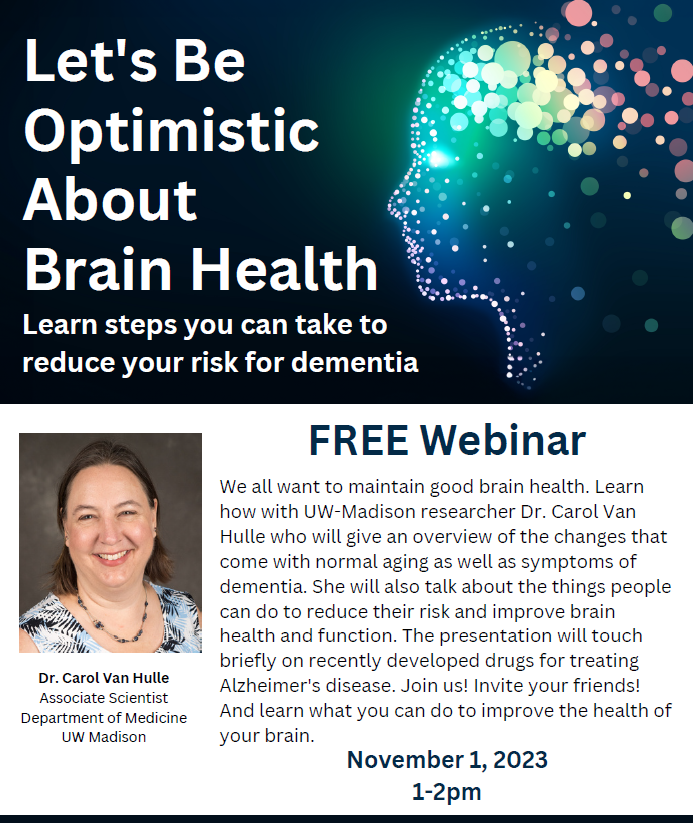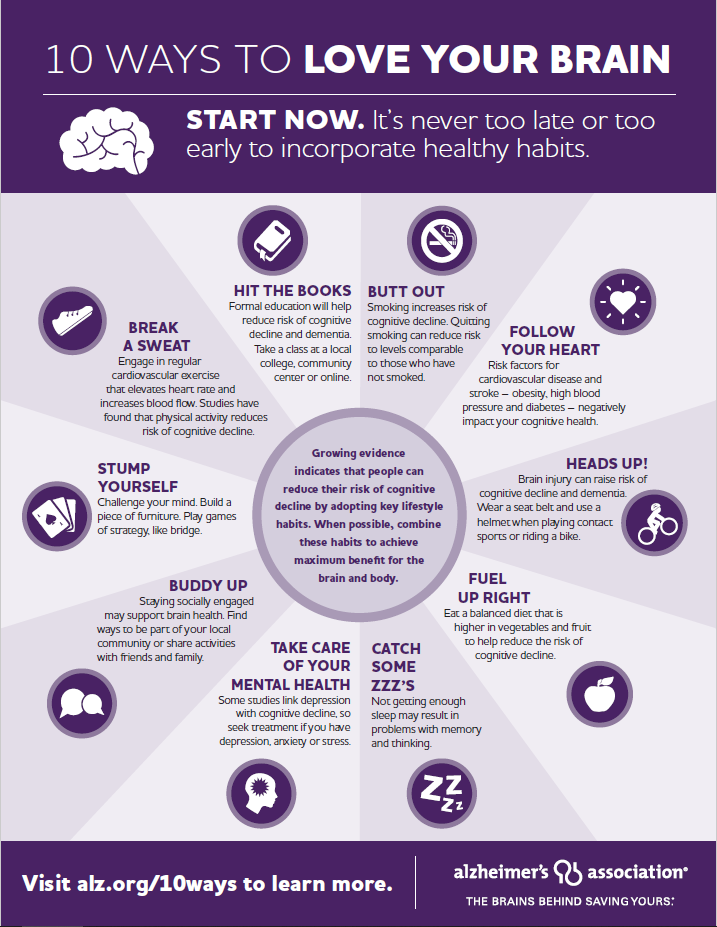
Age Well with WIHA
A newsletter from the Wisconsin Institute for Healthy Aging
Age Well with WIHA: September/October 2023
WIHA’s newsletter is published bi-monthly and sent by email. View the email newsletter online or read the full stories below. Don’t forget to subscribe!
The 3 Ms of Brain Health
Memory, Movement, & Mood
WIHA spoke with three brain health scientists from the Alzheimer’s Disease Research Center at the University of Wisconsin – Madison to learn more about brain health.

Dr. Carol Van Hulle
PhD in Psychology. Previously did research in behavior genetics.
Currently researching risk factors for and early identification of Alzheimer’s disease.

Dr. Taryn James
PhD in Pharmacology with post-doc studies in Toxicology.
Currently researching how hormones are involved in aging and memory decline.

Dr. Gilda Ennis
PhD in Psychology. Post-doc fellowship in Cognitive Aging.
Currently researching the relationship between biomarkers and cognitive decline in African Americans.
What is “Brain Health”?
A healthy brain is one that is functionally independent. According to Dr. Gilda Ennis, a healthy brain is one that “allows people to behave, think, feel, and generally function in a way that [allows them] to take care of themselves and others”. Dr. Taryn James puts it this way: “There are 3 Ms of major brain function: memory, movement, and mood. A healthy brain is one where these are all functioning well”.
What are some steps people can take to keep their brain healthy and prevent dementia and Alzheimer’s disease?
A 2020 report by the Lancet Commission shows that there are both modifiable risk factors (things you are able to change) and non-modifiable risk factors (things we don’t have control over, like our genetics). Modifiable risk factors account for 40% of worldwide dementias and include: lower education level, high blood pressure, hearing impairment, smoking, obesity, depression, physical inactivity, diabetes, low social contact, excessive alcohol consumption, traumatic brain injury (TBI), and air pollution.
According to Dr. Carol Van Hulle, there’s a lot we don’t yet understand about brain changes that lead to dementia but we can all take steps at every age to manage the things we can control. “What we know for certain is that healthy lifestyle habits appear to slow cognitive decline,” says Dr. Van Hulle, “which then delays the onset of mild cognitive impairment and dementia”.
Researcher recommendations: 1) stop smoking (if you do), 2) reduce your alcohol consumption (if you drink), and 3) get good sleep.
Dr. Ennis adds that anything you do to improve your heart health is beneficial to the brain. Maintaining a healthy weight, movement and exercise, controlling blood pressure and diabetes, these are all really important steps. Dr. James recommends movement. “Exercise helps your brain to process things and also helps to improve your mood (part of the 3 Ms of brain health)”. Other things people can do to protect brain health include maintaining a healthy diet and doing activities that stimulate the brain such as reading, doing puzzles, and being social.
What is your best advice for someone worried about their brain health?
Take steps now to reduce your risk for dementia. With 40% of the risk factors for dementia being under our control, we do have the power to reduce the likelihood for developing dementia. Even people in the early stages of cognitive impairment and dementia benefit from a healthier lifestyle. “Pay attention to the 3 Ms – memory, movement, and mood,” says Dr. James. “If you notice any changes, keep track of them in a journal and talk to your doctor.”
Occasionally forgetting something, or thinking a bit more slowly, is a normal part of aging. Dr. James describes that as a “gradual decline of brain function” but notes that it’s not normal to be extremely forgetful. If you’re concerned, says Dr. Van Hulle, the best thing to do is talk to your doctor who can help you develop a plan to increase exercise, improve nutrition, and manage your chronic conditions – things that will help to prevent or delay the onset of dementia.
It is common for people to be worried about dementia and Alzheimer’s as we age. “You can do everything right and still end up with brain disease,” says Dr. James. However, the recommendations provided here are important for reducing your risk for dementia as well as improving overall health – keys for a long, healthy life into old age. “It’s never too early to start thinking about your brain health, and it’s never too late to adopt a healthier lifestyle,” says Dr. Van Hulle. Read more about Alzheimer’s Facts and Figures.
Heart Health and Its Impact on Brain Health
Over the past 20 years, the rate of people experiencing diseases of the brain has leveled off. Why? Researchers think it’s because people are paying attention to heart health. It turns out that many modifiable risk factors that exist for heart disease are the same for dementia.
Risk Factors
With a global effort to reduce heart disease through improvements in education, nutrition, health care, and individual lifestyle changes, our brains are also reaping the benefits.
So, what does that mean for you?
What’s good for your body is good for your brain. Be physically active, eat well, get good rest, and address the factors above. If you’re looking for ways to get started, check out WIHA’s evidence-based programs. These programs can help you manage chronic conditions like high blood pressure, cholesterol, or diabetes; start and stay motivated to exercise reduce your risk of a fall, and increase your social connections.
In this Issue
FREE Webinar
10 Ways to Love Your Brain
Check out this graphic from our friends at the Alzheimer’s Association
What is a Dementia Care Specialist Program?
Do you or someone you know have concerns about memory loss or confusion? Would you like to talk to someone who can help you get answers, make plans, or find support?
The Aging and Disability Resource Center (ADRC) in your county is the home of someone who can answer your questions about dementia and about caring for someone living with dementia. The Dementia Care Specialist is someone you can talk to about concerns related to yourself or how you can support someone you know. Dementia Care Specialists can assist you with:
- Information about maintaining your brain health
- How to reduce your risk of dementia
- Talking to a doctor about memory or other cognitive concerns
- Preparing for your journey with dementia
- Providing care as a family member or friend
- Living well with dementia
- Any other concerns
The Dementia Care Specialist at the ADRC is available to talk with you on the phone or through email, and will meet with you in-person or online. They are trained dementia professionals who can provide a variety of services at no cost. These services include:
- Memory screening and referral
- Crisis prevention planning
- Evidence-based family caregiver support programs
- Dementia-friendly community training
- Memory Cafes
- Meeting with individuals and families
- Connection to other sources of support
If you would like to learn more about the dementia care specialist near you please visit ADRC: Support for People with Dementia and their Caregivers | Wisconsin Department of Health Services
Get those ZZZZs – Why Sleep is so Important to Brain Health
One in three of us is not getting enough sleep and that can have a serious effect on brain health. Researchers have discovered two markers for dementia – beta-amyloid and tau – that build up in the brain over time. Sleep, particularly deep sleep, gives the brain a chance to clear these out. People who get less deep sleep have more beta-amyloid and tau. Try to get an average of seven to eight hours of sleep a night with these sleep strategies:
- Have a regular wake-up and bedtime.
- Keep a nightly routine and limit naps during the day (if they prevent night-time sleep). Dim lights before bed can be helpful to maintain a regular sleep schedule.
- Turn off electronics 30 to 60 minutes before heading to bed.

Find a Workshop
Take charge of your health by taking a WIHA workshop. We offer in-person and virtual (online or by phone) programs that give you the tools to age well. Getting started is easy – simply click the link below.
Enjoyed the newsletter? Subscribe today!


